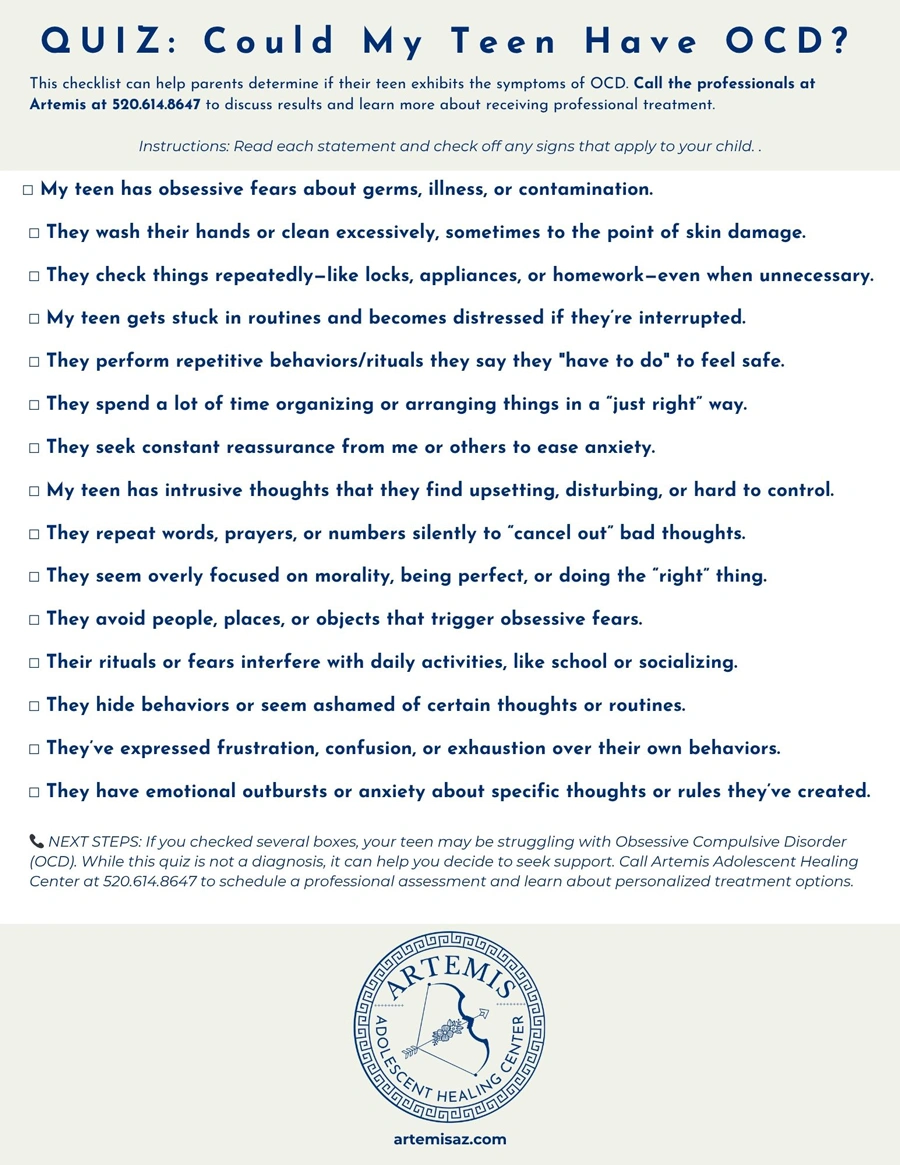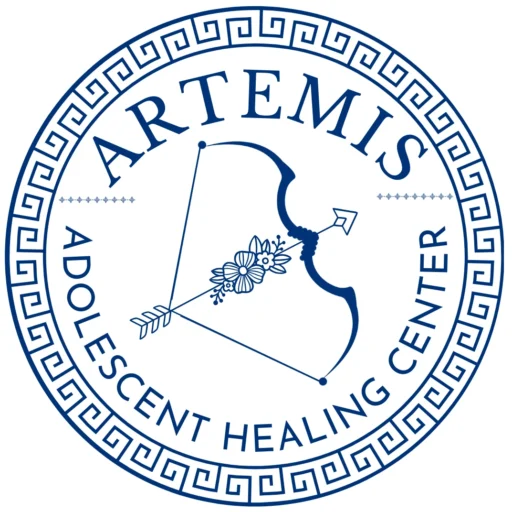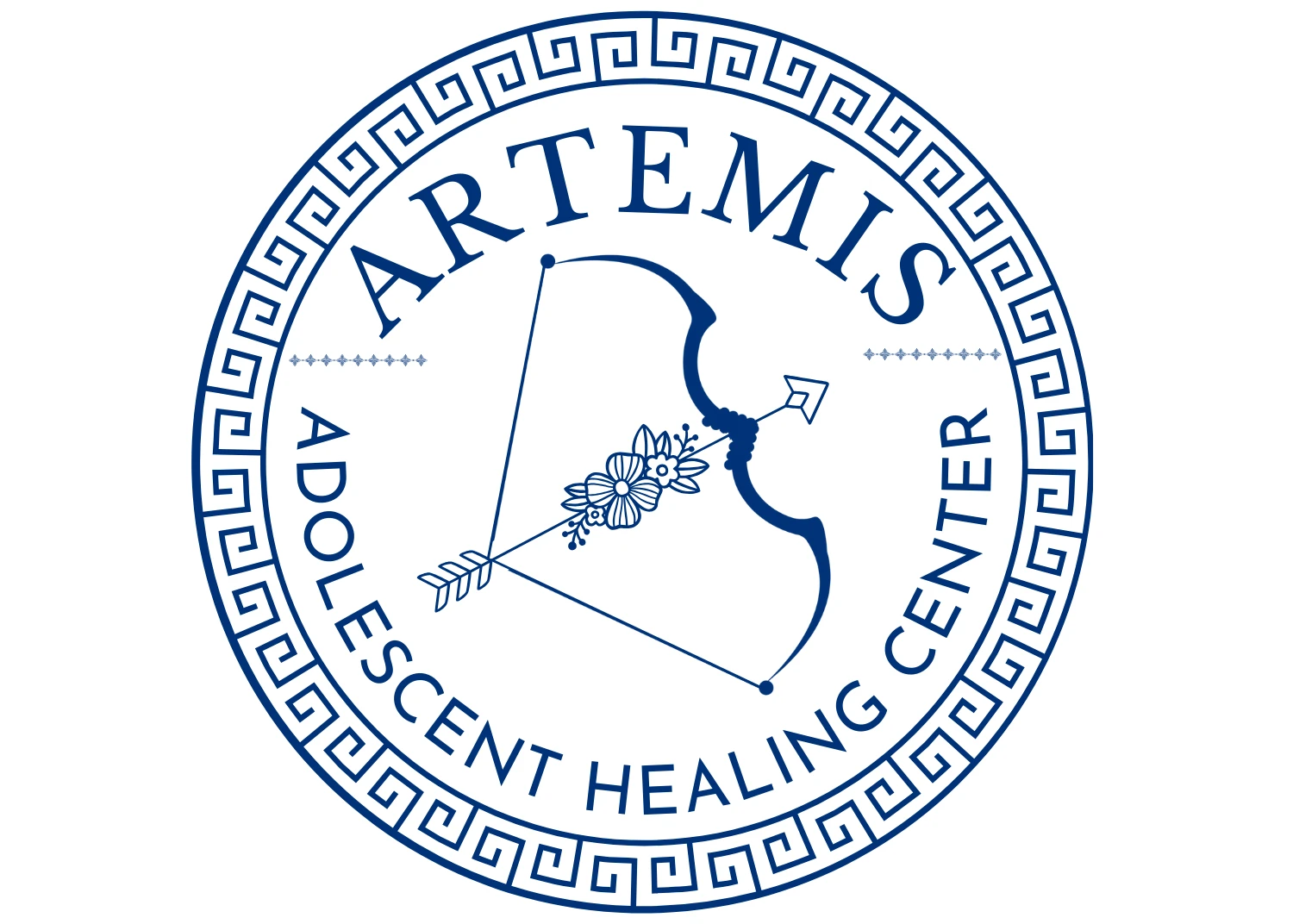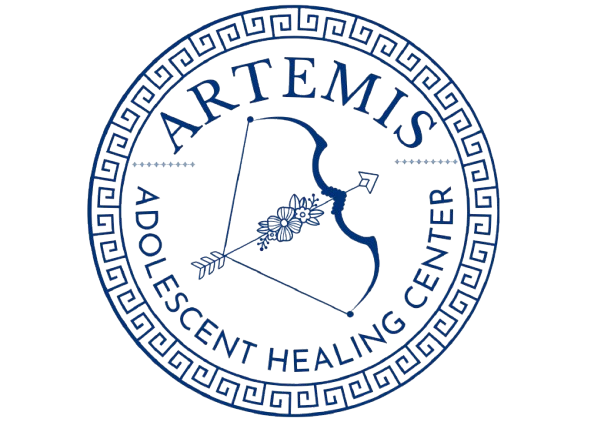Guidance to Determine If Your Teenager Has Symptoms of OCD
Do you suspect that your child worries excessively and has obsessive thoughts and compulsions? Seeing the symptoms of OCD in a child, adolescent, or young adult is a great concern for parents. If you are unclear whether your teen is struggling with a mental health disorder or just developing some atypical habits, our informal online OCD test for teens can help you look for the signs.
The team of licensed mental health professionals at Artemis Adolescent Healing Center, a Joint Commission-accredited OCD treatment center in Tucson, offers help for the unwanted thoughts and compulsive behaviors.
We understand how the constant cycle of obsessive-compulsive disorder (OCD) can disrupt academic performance and hold your teen back from completing basic tasks.
The evidence-based treatment options at Artemis address common obsessions and help teens aged 13 to 18 and their family members reclaim their lives. We encourage you to keep reading to learn more about OCD behaviors and download our online test to look for OCD symptoms.
Our Online OCD Test for Child/Adolescent Obsessive Compulsive Disorder (OCD)

Consider this online obsessive-compulsive disorder quiz an OCD screening for the presence of symptoms, including repetitive behaviors, extreme fears, and rituals. This checklist quiz can help you identify OCD symptoms. However, it cannot diagnose OCD and cannot be considered an accurate diagnosis. An experienced, licensed mental health professional will be the correct person to diagnose OCD.
After you take our informal OCD test, call the Artemis admissions team to discuss the results with us. We’ll listen to your online assessment results and help you book a full evaluation for your child, looking at specific behaviors, environmental influences, and family history.
Get Confidential OCD and PTSD Assessment at Artemis
Possible Implications of Your Online OCD Test Results
As mentioned earlier, an online OCD test isn’t a diagnosis. However, it can help you see repetitive behavior patterns worth keeping an eye on. If you checked several boxes, it’s time to schedule a professional assessment.
Early detection of OCD is powerful and gives your teen the best chance of overcoming obsessive-compulsive disorder.
9 of the Most Common Signs a Teen Is Struggling with OCD

Here are some particular symptoms that are common in teens with OCD:
- Expressing Intrusive Thoughts: These aren’t random, infrequent thoughts. They lead to the disruption of daily activities and task completion. The child/adolescent may be unable to complete school assignments, pay attention to simple instructions, or maintain social relationships because of these intrusive thoughts.
- Belief in Bad Things Happening: This doesn’t refer to when a child avoids touching a hot stove to avoid a burn. These are unfounded fears of devastation, destruction, and death in a severity that goes beyond typical fears.
- Obsessions with Cleanliness: We all know that bodily fluids can carry germs. But teens and young adults with OCD can develop extreme anxiety about pathogens, leading to excessive handwashing, showering, or cleaning objects even when they’ve already been cleaned. If they think someone may mess things up, they’ll clean again.
- Feel Compelled to Extreme Orderliness: This teen may count everything, demand perfection, and reorder things. They experience anxiety if things are not in a very specific order and symmetrical, and they believe that the arranged things protect them from harm to themselves or a loved one.
- Repeat Checking Behaviors: The child will repeatedly check light switches, appliance “on” buttons, or door locks. The child worries excessively about family members’ safety. They believe these behaviors are necessary to prevent bad things from happening.
- Fear of Offending God: One type of OCD involves unwanted thoughts about sins or angering God. They obsessively pray to redeem themselves or feel compelled to engage in religious activities. These practices are excessive, reaching far beyond the daily prayer that adults have taught the child.
- Emotional Outbursts: It’s pretty standard for teens to have emotional outbursts once in a while. But these are not those often puzzling breakdowns most parents have witnessed occasionally. The child with OCD may exhibit rage, panic, or a total meltdown if interrupted for any reason while they perform compulsive rituals.
- Avoiding Triggers of OCD: All teens drag their feet about doing certain things, like brushing their teeth or putting away laundry. But teenagers with OCD go to great lengths to avoid things that trigger obsessions. For instance, a child may avoid the bathroom to stop their handwashing rituals.
- Seeking Reassurance: Teens with OCD may continuously ask for reassurance, with the need for reassurance being closer to a toddler than a young adult. They will ask if things are okay or if the family will be safe because they fear bad things happening.
Knowing the signs is the first step toward getting evaluation and therapy for your teen.
Get Accredited Treatment Programs at Artemis
Understanding OCD Treatment with a Mental Health Professional
Working with a professional counselor or therapist ensures that your child/adolescent receives an effective OCD treatment plan to end their struggles with intrusive thoughts and compulsions.
At Artemis, we build all treatment programs around each teen struggling with OCD and provide the coping tools needed to maintain long-term healing.
Common Treatment Options for Teen OCD

Enjoying better mental health starts with the assessment but requires professional intervention and customized programs.
Below are some therapies proven effective in many teens and young adults with OCD:
Evidence-Based Therapies
Licensed therapists can lead teenagers through a host of therapeutic interventions, depending on their needs, especially these:
- Exposure and response prevention (ERP)
- Cognitive behavioral therapy (CBT)
- Acceptance and commitment therapy (ACT)
Our team will determine which interventions would be the most effective based on the disruptiveness of the individual’s obsessions and compulsions.
Medication Management
Proper administration of prescription medications is especially crucial when dealing with the health of children, teens, or young adults. Our program will ensure the mental health disorder is well-treated, with dosing optimized for the individual teenager.
Planning for Management of Daily Life After Treatment
Parents sometimes wonder what will happen when their child or adolescent leaves the treatment program and returns to family life. We work with parents and caretaking adults to ensure that everyone has the tools to continue managing obsessions and compulsions and living a balanced, successful life.
Co-occurring Disorders: A Second Mental Health Diagnosis

Our team will also check adolescents for any second mental health diagnosis, which can sometimes co-exist with OCD. Some of these include depression, generalized anxiety disorder, eating disorders, panic disorders, or post-traumatic stress disorder.
We’ll be sure to treat all conditions to avoid a repeat appearance of the obsessions and compulsions of OCD.
What Happens if You Don’t Treat OCD in Children or Teens?
When OCD in adolescents or young adults goes untreated, it continues to progress and cause additional disruptions. The small rituals can escalate, becoming overwhelming in life. They can lead to loneliness, academic gaps, and a lower quality of life.
Up To 100% of Rehab Costs Covered By Insurance
Connect with Artemis for Help After Completing the OCD Test
Whether you’re the parent of a young child, adolescent, or young adult, it’s natural to worry about your loved one’s mental health. Our OCD test is just a first step toward breaking down the harmful cycle and symptoms of OCD. Call Artemis Adolescent Healing Center today for accredited OCD help for your child. It’s free and confidential to speak with us about their symptoms.






